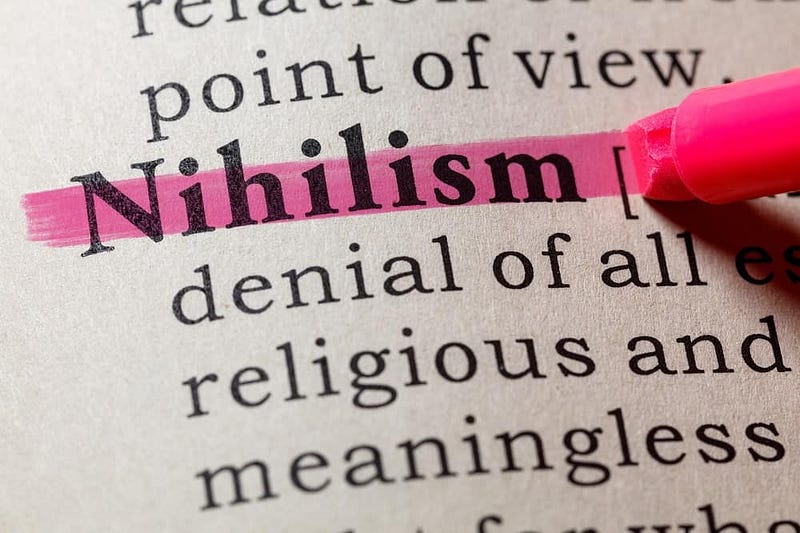A New Perspective on Constructive Nihilism for Peace and Happiness
Written on
Chapter 1: Introduction to Constructive Nihilism
After millions of years of evolution, humanity has finally arrived at a groundbreaking realization. Cognitive scientists have unveiled a transformative worldview that promises not only personal happiness but also world peace. While numerous worldviews have emerged throughout history, most have fallen short due to their inability to provide lasting solutions for everyone. Until now, that is.
This emerging perspective, which is gaining significant traction, marks a pivotal moment in our cognitive evolution. It represents the ultimate blend of personal freedom and happiness—the answer to the quest for global harmony: constructive nihilism.

Chapter 2: Understanding Nihilism
You might be asking, "Isn't nihilism just a philosophy that claims everything is meaningless?" While that is a common perception, it’s essential to delve deeper. Nihilism, by definition, encompasses a range of philosophical views that reject established concepts of knowledge, morality, and meaning. Historically, nihilists have been unfairly categorized as anarchists or pessimists, largely due to misconceptions propagated by popular culture.
In contrast to these outdated stereotypes, contemporary nihilists are often well-educated, empathetic, and altruistic individuals. Before diving into constructive nihilism, it’s crucial to clarify the foundations of traditional nihilism.

Section 2.1: The Truths of Nihilism
One of the fundamental truths nihilism uncovers is that language is entirely constructed. Each word we speak or write is simply a product of human creation—a series of sounds or symbols that lack inherent meaning. From faiths and religions to laws and cultural norms, everything is artificially constructed and carries no intrinsic significance.
Thus, the reality we inhabit is shaped entirely by our perceptions and beliefs. The universe, indifferent to our existence, continues its course, reminding us that, in the grand scheme of things, we are but fleeting entities. Life, at its core, lacks inherent meaning or purpose—a fact that, while uncomfortable, remains true. Those who assert otherwise often base their beliefs on previous constructs or wishful thinking.
Consequently, any worldview outside the nihilistic framework struggles to stand on solid ground. Nihilism, in its essence, is a viewpoint that can confidently assert, “I am correct, and others are misguided.”
Section 2.2: The Limitation of Nihilism
However, nihilism ultimately concludes with a bleak realization: “Nothing truly matters.” This resignation can be disheartening and has led to widespread criticism. The challenge lies in the fact that while we are alive and capable of feeling emotions, mere acknowledgment of life’s meaninglessness is insufficient. We need more than just the notion of “life is meaningless; enjoy it!”

Chapter 3: Embracing Constructive Nihilism
Constructive nihilism emerges as a solution, proposing that even within a seemingly meaningless existence, individuals can carve out their own purpose and fulfillment. This philosophy encourages the creation of personal meaning amidst the chaos, allowing us to embrace our freedom to design our lives.
When we recognize that much of what governs our lives is a construct, we liberate ourselves to forge our unique paths. By acknowledging the arbitrariness of societal constructs, we become less perturbed by the trivial disputes humans often engage in.

Section 3.1: Principles of Constructive Nihilism
Understanding the core tenets of constructive nihilism is vital:
- Focus on Authentic Life: Constructive nihilists prioritize organic life and express genuine concern for all forms of existence not created by humans.
- Commitment to Education: Continuous learning about realism and science helps differentiate fact from fiction within our constructed realities.
- Rejection of Outdated Ideologies: Faith-based systems and rituals are viewed as relics of our past, holding no relevance in a modern context.
- Evolving Morality: Morals are not static but evolve with societal progress, driven by scientific understanding and human empathy.
- Rejection of War: Recognizing that life simply is, constructive nihilists see no justification for conflict—everything else is merely constructed noise.
- Reevaluation of Conditioning: Breaking free from childhood and cultural conditioning allows individuals to redefine their beliefs based on realism and logic.
- Pursuit of Enjoyment: Constructive nihilism encourages a hedonistic approach to life, allowing individuals to enjoy the sensory experiences without being hindered by societal constraints.
The essence of constructive nihilism lies in maximizing life through adventure, self-improvement, and openness. In recognizing the void of inherent meaning, we paradoxically unlock the potential for infinite possibilities.
Section 3.2: The Path to World Peace and Happiness
A typical day for a constructive nihilist focuses on nurturing genuine connections with life and prioritizing the well-being of all living entities. Many who embrace this philosophy are humanists, continuously pursuing knowledge and understanding.
The transformative nature of constructive nihilism allows for a more profound appreciation of existence. As we create our significance, we foster a world brimming with opportunity and joy.
To underscore the importance of this philosophy, consider the following video:
The first video, We Have Peace with God | A Thrill of Hope (Part 1), explores the intersection of spirituality and peace, resonating deeply with the themes of constructive nihilism.
Subsequently, this video further illustrates the internal quest for peace:
The second video, All the peace we'll ever need is living and abiding inside of us, emphasizes the intrinsic nature of peace within ourselves—a core principle of constructive nihilism.
In conclusion, the world would undoubtedly benefit from the widespread adoption of constructive nihilism. With 8 billion individuals embracing this philosophy, we could cultivate a happier, more peaceful existence for all.